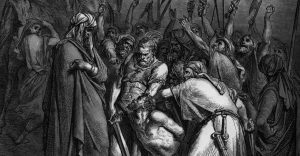It’s one of our most loved Bible verses. It’s a staple of many funeral services. It’s proven a wonderful comfort in times of grief. I’m speaking about our Lord’s promise to his distressed and confused disciples that he is going away to prepare a place for them. Where is Jesus going? To his Father in heaven, of course. And what will Jesus be doing when he gets there? Well, he’ll be very busy. Because he will “prepare a place for you” (John 14:2)—and since there will be lots of “you”, that’s an awful lot of preparation. Then, “I will come back and take you to be with me.” It is a picture—and we assume it’s only a picture—of Jesus (presumably with his army of angelic bricklayers, plumbers and electricians) building myriad of homes for the eternal dwelling of his people.
It is a picture—and we assume it’s only a picture—of Jesus building myriad of homes for the eternal dwelling of his people.
One contemporary parallel might be that we have a couple who are engaged to be married. And the guy tells his fiancée, “Honey, you stay here in Singapore. I’m going to fly over to Melbourne and find a lovely place for us by the Yarra River. I’ll make it ready and then I’ll come back, we’ll get married, and move to the most liveable city in the world”.
Is that what Jesus is saying? (Not the bit about Melbourne being the most liveable city in the world.) Is that wonderful promise, of the place our Lord will prepare for us, about the future … or the present? Is our dwelling with God something we receive in this age or in the age to come?
Heavenly Houses?
This teaching is part of what’s known as Jesus’ Farewell Discourse (John 14-17). He’s in the Upper Room celebrating the Passover with the Twelve. They’re only hours away from his arrest, trial and execution. The purpose of these last words is to prepare the disciples for his departure, and for the extreme time of trial that they too, will face. He tells them that very shortly he’ll leave them for a place to which they cannot come (13:33). He assures them that they shouldn’t be troubled by all that’s about to happen. Rather, they’re to trust in God and trust in him (14:1). And they needn’t be troubled because this separation he’s preparing them for will only be temporary. He will come back and take them to be with him.
Jesus then gives this lovely picture of him going to his Father’s house in which there are many rooms, or, in the old KJV, many “mansions”. It’s a word today that conjures up images of large celestial estates. Perhaps we envisage ourselves roaming eternally in our very own Downton Abbey or Buckingham Palace.
The KJV word rendered as ‘mansion’ is mone, which most modern versions translate more accurately and prosaically as ‘place’. It simply means ‘room’ or ‘dwelling place’. And it only appears twice in the New Testament—both times in this chapter. The other occurrence is in v.23: “Anyone who loves me will obey my teaching. My Father will love them and we will come to them and make our home [our mone] with them”. The context of this verse is the coming of the Spirit (v.16ff) to live in the disciples. Indeed, the Spirit’s coming to them is really Jesus’ coming. He won’t leave them as orphans, but rather, “I will come to you”. So, the only other reference to ‘place’/‘room’, in this farewell sermon, is where Jesus speaks about dwelling with his disciples now—in this new age, about to be inaugurated by his death, resurrection and the gift of the Spirit.
But it doesn’t stop there. The verbal form of the noun mone, is meno, which means to ‘room with’ or ‘stay with’. Most Bible versions render it, ‘remain’ or ‘abide’. The theme of abiding with Jesus in the room he prepares for us, which began in 14:2, then continues into chapter 15. It’s another instance where the insertion of a chapter break tends to obscure the flow of the passage. Here Jesus switches metaphors from a home to a vineyard. Using an image rich in Old Testament associations (e.g. Isaiah 5) he encourages his disciples to “remain in me” and assures them that he will also remain in them (15:4). This is precisely what he’s promised from the beginning of the discourse: the mutual dwelling together of the Triune God and his people.
So, to what and when is Jesus referring in 14:2? We’ve readily assumed he’s referring to heaven. We’ve assumed he’s telling his disciples that, after he dies and rises again, he’ll go to heaven and while there, get a house ready for his people. Then at some time in the (distant) future, at what we call his ‘Second Coming’, he’ll take all his disciples to be with him in their new heavenly homes.
Each other reference to mone/meno in this passage speaks not to the future, but the current experience of the disciple of the Lord Jesus. He was speaking about the present. Right here and now we live with him in his Father’s house.
But a closer reading of the whole passage points in another direction. Each other reference to mone/meno in this passage speaks not to the future, but the current experience of the disciple of the Lord Jesus. He was speaking about the present. Right here and now we live with him in his Father’s house.
A Place or a Person?
But what about v.3? “…and take you to be with me that you also may be where I am going.” It sounds like Jesus is going some place else, and will come back and take us there. Surely, that’s heaven. But wait, where is Jesus going? Is it some place else? The next verses answer that question. Jesus tells the disciples that they know the place where he is going (v.5). Then to Thomas’ bewildered admission that they know neither the place nor the way to get there, Jesus tells them. He tells them both the destination and the means of arrival. He announces, “I am the way…no one comes to the Father, except through me” (v.6). He will take them to the Father. So, Jesus isn’t going somewhere but to someone: And when will the disciples see the Father? Jesus says, “And from now on…” (v.7).
Jesus’ original hearers would have understood his ‘Father’s house’ as a reference to the Temple (cf. Luke 2:49 which is usually rendered, “my Father’s house”; although this is by no means the only possible interpretation). The Temple was the dwelling place of God, and soon its doors would be thrown open for all to enter. This was dramatically symbolized after Jesus’ death on the cross when the curtain of that Temple was torn apart. The way into God’s house was made open.
In John 14:2 Jesus is telling his disciples that by dying and rising again he’ll go and prepare a place, or a room, for them. And it won’t be a case of ‘book now’ before all the rooms are taken. No, once atonement for our sins has been made the way is opened and there’ll be lots of rooms in the Father’s house. Jesus will then come by his Spirit and he and the Father will make their home or abide with all his people. There’s plenty of room for all.
So, sorry, there are no mansions in the sky. Just a much richer expression in the new creation of what we experience now, by our life in the Spirit. Right now, we are at home with the Father and the Son and the Spirit. And there’s plenty of room for everyone, from every tribe, nation and tongue.















